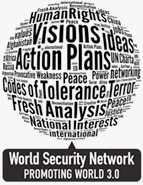Zuhairi Misrawi: Promoting religious tolerance, pluralism

It was during his university days at Al-Azhar University in Cairo, Egypt, that young Muslim intellectual Zuhairi Misrawi learned both the practical and philosophical essence of religious tolerance.
When he and his colleagues visited Egypt's Catholic Archbishop Youhanna Qaltah to interview him for the students' journal, Qaltah immediately halted the conversation when the azan (call to prayer) was heard.
"If you want to perform your wudhu (ablution before prayers), the place is located on the right side of the church. Please feel free to say your prayers ... this is the praying map with the kiblah direction," said Qaltah, gently indicating the map to his guests.
Zuhairi cannot hide his admiration.
"His understanding and respect are an acknowledgement of Muslims' very existence," Zuhari told The Jakarta Post during a recent interview on the sidelines of a discussion of his new book Al Qur'an Kitab Toleransi: Inklusivisme, Pluralisme dan Multikukturalisme (Koran, the Tolerant Holy Book: Inclusivism, Pluralism and Multiculturalism).
"This is in contrast to what I have always been taught that non-Muslims are unappreciative towards Muslims and are even willing to destroy Islam," he added.
Born Feb. 5, 1977, in Sumenep, Madura, Zuhairi studied at the Islamic boarding schools al-Amien and Jami'iyyah Tahfidzil Qur'an.
He was raised in the Nahdlatul Ulama (NU) tradition; the country's biggest Muslim organization that claims to have 35 million members.
After studying at Islamic boarding schools for almost six years, Zuhairi continued his education at the Ushuluddin Faculty of Al-Azhar University in Cairo, Egypt (1995-2000).
He became an editor for Terobosan bulletin and Oase journal at the university, allowing him to interview several foremost intellectuals, including Yusuf al-Qaradhawi, Sayyed Yasin, Halah Musthafa, Youhanna Qaltah, 'Athif 'Iraqi, Muhammad 'Abdul Mu'thi Bayoumi, Adonis and Nawal Saadawi.
After completing his studies in 2000, he returned home to Indonesia and immediately joined the Department of Research and Human Resource Development of NU as coordinator for the study and research division from 2000-2002.
He delved further in activism with NU.
Zuhairi helped publish Tashwirul Afkar journal as its editor and was also active with the Indonesian Society for Pesantren and Community Development as a coordinator for the Islamic Emancipation Program.
Despite of his tight schedule as an activist, Zuhairi still manages to write prolifically. His writing mainly covers contemporary Islam, politics, religious tolerance and inter-faith dialogue.
Aside from writing for the national media, Zuhairi has also produced books, including Dari Syariat menuju Maqashid Syariat (From Sharia to Maqashid Sharia, 2003); Doktrin Islam Progresif (Doctrine of Islamic Progressive, 2004); Islam Melawan Terorisme (Islam against Terrorism, 2004); and Menggugat Tradisi: Pergulatan Pemikiran Anak Muda NU (Challenging Tradition: Struggle of Thoughts among NU Youth Members, 2004).
He also contributed chapters to several books, including Syariat Yes, Syariat No (Sharia Yes, Sharia No, 2003); Menjadi Indonesia; 13 Abad Eksistensi Islam di Bumi Nusantara (Becoming Indonesia; Thirteen Centuries of the Existence of Islam in the Archipelago, 2006); and Islam Mazhab Tengah: Persembahan 70 Tahun Tarmizi Taher (The Middle Mazhab of Islam: Dedicated for Tarmizi Taher on his 70th Birthday, (2007).
An adherent supporter of moderate-progressive Islam, Zuhairi showed his anxiety when asked about the increased Islamic radicalism in the country.
Zuhairi said many seemed unaware the power of love in Islam derives from bi-sm 'allaah ar-rah maan ar-rah em, which means "in the name of Allah Most Gracious Most Merciful".
He further cited his experience when he visited a mosque in Boston, U.S., where the Koranic verse al-Anbiya:107 is vividly displayed on its front wall: "And (thus, O Prophet,) We have sent thee as (an evidence of Our) grace towards all the worlds".
"This means God sent Prophet Muhammad as a blessing for all the worlds," said Zuhairi, who recently returned from a conference on democracy and pluralism in Brussels where he was a speaker.
He criticized the religious violence that has marked the country, which he said was an obvious diversion of the Prophet's teachings.
"Fortunately, what has saved our country from plunging into a situation like conflict-torn Pakistan is the role of NU and Muhammadiyah," Zuhairi said.
Muhammadiyah is the second biggest Muslim organization in the country, which claims to have 25 million members.
The two prominent Islam-oriented organizations are considered societal pillars in the country. They are not politically oriented; nonetheless, their leverage in Indonesia's political scene is undisputable, Zuhairi said.
The leaders of the two organizations have called on the government to take strong measures against Islamic hard-liners that campaign for the "elimination" of minority groups.
Young Islamic activists from the two organizations, including Zuhairi, unremittingly collaborate to promote a new Indonesia, which respects pluralism and democracy. He said pluralism, or al-ta'addudiyyah, is an inevitable fact due Indonesia's vast diversity.
He added sharia was a cultural product because it had been historically constructed.
"Sharia is attached to a specific territorial, geographical and socio-political culture. Hence, an idea has emerged to deconstruct the historicity of sharia to search for an inclusive dimension of Islam," said Zuhairi, who is married to Nurul Jazimah and has one daughter.
Zuhairi and his fellow activists from the two organizations work hand in hand to fight against corruption, which many say was further decentralized after the country embraced the era of regional autonomy.
When asked about the demand of some sections to establish an Islamic caliphate system of government, Zuhairi answered: "Historical evidence shows that the caliphate system was bankrupt since it was unable to overcome the problems of power sharing and distribution. They (the political elites) proved unable to detach themselves from authoritarianism.
"There is no obligation to implement a caliphate system, because all Muslims are automatically created by God to become caliphs. It means that every human being has to be responsible for all his deeds to God in the hereafter ... in the Koran, caliph is more a personal than collective calling," he said.
Zuhairi has participated in the activities of several other organizations, including Lingkar Muda Indonesia (Youth Indonesia Circle), Moderate Muslim Society and Lembaga Studi Islam Progresif (Islamic Progressive Study Institute).
And he shows no signs of slowing down.
In an apparent move to prepare himself to enter the world of politics, he became head of the Inter-Religious Division of the Executive Board of Baitul Muslimin of the Indonesian Democratic Party of Struggle at the end of 2007. Last month he was officially inaugurated as a member of the political party.
Yet his activism goes beyond his country by showing his apprehension of the ongoing conflict in the Middle East.
"A holistic, not partial approach needs to be pursued," he said, adding the conflict could not be regarded as simply Israel versus Palestine or Israel versus Lebanon.
He added internal problems needed to be tackled first and that all Arab countries in the Middle East should put aside their respective interests and unite to boost their bargaining power with the U.S. and Israel in resolving the ongoing conflict.
In 2006, Zuhairi visited Israel on the invitation of the Israeli government under Prime Minister Ehud Olmert, to provide a second opinion on Israel's policy towards Palestine.
"I said (to the Israeli government) that Israel should use 'soft' politics, not 'hard' politics with Palestinians because they (the latter) are already weak," he recalled his meeting with the Israeli officials.
He said he supported the establishment of relations between Indonesia and Israel.
He hinted that since Israel is the only superpower in the Middle East, establishing relations with the country could pave the way for Indonesia as the biggest Muslim country to capitalize on its leverage over the ongoing conflict, which has cost millions of innocent lives.








Comments